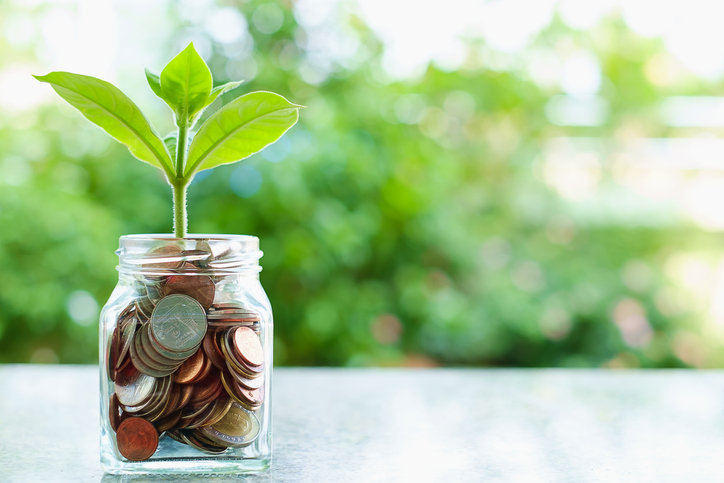Sustainable investing
With sustainable investing strategies, you are looking for financial returns as well as social or environmental impact. So-called ESG investing has grown in popularity fast. Moreover, sustainable investing can generate high returns. But be aware of the different ways of green investing.
Contents:
- What is impact investing?
- Popular sustainable investing platforms
- Popularity sustainable investing growing
- Returns and risks
Please note: trading on the financial markets involves risks, you can (partially) lose your investment.
What is sustainable investing?
Sustainable investing or impact investing puts money towards companies and organizations that make a positive social or environmental impact as well as financial returns. The goal of sustainable investing is to reduce the negative effects businesses have on society, such as damage to the environment. Impact investors look for more ethical ways to invest while also generating returns.
One way to measure how ethical investments are is by ESG standards. ESG stands for environmental, social and governance. ESG criteria are typically used to screen investments on climate impact, working conditions and ethical leadership. ESG investing is otherwise known as green investing, sustainable investing or socially responsible investing (SRI).
Sustainable investing aims for returns and social impact.
ESG investing and impact investing are often used interchangeably. But in general, the difference between ESG and impact investment is that the latter will measure and report societal impact. Usually this is done by a third party. Therefore, an impact investment consists of investors, an executive party running the company or project as well as impact reporters. In contrast, ESG criteria are used to screen future investments on possible risks.
Open an account directly with Etoro, a large European broker, or with Freedom24, which offers a range of one million stocks, ETFs and options. Investing involves risks. You can lose your investment.
How to start ethical investing
There are several ways for asset owners to invest sustainably, such as investing in sustainable companies, crowdfunding projects, (index) funds or even impact bonds. Ethical investing can also span across many industries, from agriculture to renewable energy and healthcare. Microloans for small businesses in emerging economies also form a popular category for impact investors.
You can invest in sustainable companies and projects.
To make an investment, you do not have to go to the bank. You can get started easily with online brokers and crowdfunding websites. Some of the most popular European investment platforms that specialize in green investing are:
Oneplanetcrowd is a Dutch crowdfunding platform with a focus on sustainable capital. It mainly works with convertible loans. Startups that have a sustainable or social mission can raise funds through the platform.
Lendahand is a crowdfunding platform on which you can invest in entrepreneurs in developing countries. You can earn up to 7% in annual interest. Start investing with just €50.
Through EthicHub, investors can invest in agricultural projects and receive returns on their investments. These projects are carefully selected and verified, and investors have the opportunity to contribute directly to the development of sustainable agricultural communities through smartcontracts.
Sustainable investing growing in popularity
Sustainable investing has grown more popular in recent years, which can be linked to the climate change crisis. Institutional investors, such as fund managers and banks, have a higher demand for investing sustainably. According to the European Investment Fund, between 60 and 70 percent of venture capitalists consider sustainable and social factors when choosing to fund a company. Thus, a majority of investors find sustainable investing important. In addition, more young people have started investing and make investment decisions in line with their morals.

Sustainable investing is even one of the fastest-growing categories for asset management. Between 2020 and 2021, assets in sustainable funds grew over 50 percent according to data from Morningstar. Moreover, impact investments are expected to account for 50 trillion dollars in 2025.
The market for sustainable investments is growing fast.
Impact investments are expected to continue to grow, as the market is professionalizing. For example, the European Union (EU) is promoting green investing as part of its sustainability targets. For this reason, the EU is developing an Europe-wide standard for green investments, such as sustainable bonds and investment funds.
Returns of impact investments
If you want to invest in line with your moral compass does not mean you have to settle for less. In fact, a sustainable investment can generate good or above average returns. As much as 88 percent of impact investors said their investments met or exceeded their expectations, according to a survey by the Global Impact Investing Network. Overall, in the long run, research shows impact investments deliver market-rate returns.
Sustainable funds also outperform traditional funds and indexes, research from both Morningstar and Morgan Stanley Institute shows. In the United States this meant a median total return difference of 4.3 percent in 2020.

Risks of sustainable investing
Investing always comes with some risk, and ethical investing is no exception. However, it is a misconception that ethical investing is by definition higher in risk. This is not at all the case. The amount of risk mostly depends on the specific investment product. As mentioned before, this can vary from a crowdfunding project to a share in a sustainable company.
Ethical companies are more future-proof.
First of all, socially responsible investors avoid certain risks by following ESG factors. ESG issues can significantly harm a company’s market value and reputation, from waste spills to worker safety accidents. Moreover, companies that are considered ethical are in general more future proof. For example, there are increasingly more penalties for damaging the environment as climate change goes on. Sustainable companies will not be harmed by this.
In more traditional terms, some impact investments can be quite illiquid. Shares in an ethical business can of course be traded on the stock exchange, but investments in impact projects can not. In general, these also have a more long-term investment horizon. Make sure to do your due diligence before investing in such projects. You can also spread risk automatically by buying into impact funds and indexes.




